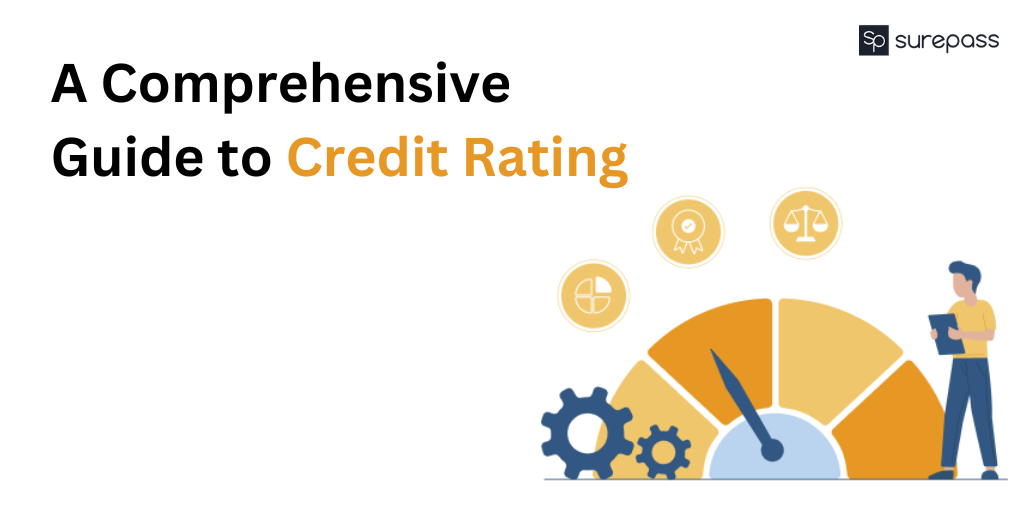Define Credit Rating
A credit rating serves as a tool for evaluating the creditworthiness of various entities, including people, groups, companies, governments, non-profit organizations, and even whole nations. In order to determine whether or not these borrowers would be able to repay loans on time, special credit rating companies assess their financial risk.
The credit rating agencies use a thorough assessment that includes a number of variables, including past debts, future economic potential, lending and borrowing history, and capacity to repay the loan.
Types Of Credit Rating
A high credit score enhances reliability and shows a prior history of on-time loan repayment. It assists investors and banks in making decisions about whether to approve loan applications and what interest rate to give.
Similar alphabetical symbols are used by numerous credit agency organizations to calculate credit ratings. These ratings are further divided into two categories, though: “investment grade” and/or “speculative grade.”
- Investment grade: These grades indicate that the borrower will probably fulfil the requirements of repayment and that the investment made is sound. They generally have lower prices as a result.
- Speculative grade: These ratings indicate a higher risk and frequently higher interest rate associated with the investments.
Credit Rating and Credit Score- Differences
Although the phrases credit score and credit rating are occasionally used synonymously, they are not the same.
As previously stated, a credit rating is used to assess a company’s or business’s creditworthiness rather than that of a person. This basically indicates the likelihood that they may miss payments. The rating is determined using corporate financial instruments and is often shown as a string of alphabetical symbols.
On the other hand, a person’s credit score is a number that they are often assigned to assess their creditworthiness, and it ranges from 300 to 900. It influences a person’s eligibility for loans and credit cards and is determined by credit bureaus using the individual’s credit information report.
Importance Of Credit Rating
A higher credit rating indicates that the firm or organization is more likely to repay the borrowed credit, as a credit rating is an evaluation of a borrower’s creditworthiness. However, having a lower credit score might indicate that they are more likely to become defaulters. Because lenders will view them as high-risk borrowers, this may make it difficult for them to obtain money.
Nevertheless, credit rating matters in other areas as well:
For Lenders
- Considering the risk of the company borrowing the money helps lenders and investors make wiser and more prudent investment decisions.
- Lenders can be sure that their money will be repaid on schedule and with the appropriate level of interest when they are aware of a potential borrower’s credit rating.
For Borrowers
- Higher credit ratings make businesses appear less risky, which makes it easier for loan applications to be accepted.
- Higher credit-rated organizations can also receive cheaper interest rates on loans from lenders like banks and financial institutions.
Therefore, a firm may acquire capital and grow more cheaply by having a higher credit rating, which also lowers the cost of borrowing. Additionally, these ratings can support improved accounting standards and give lenders access to more comprehensive financial data.
Automate your KYC Process & reduce Frauds!
We have helped 200+ companies in reducing Frauds by 95%
Function Of Credit Rating
Similar rating ranges (from AAA to D) are provided by several credit rating agencies to indicate a company’s creditworthiness and the risk that it poses to investors for long- and mid-term debt instruments.
| Rating Scale | Symbol |
| Lowest credit risk / Excellent credit rating | AAA |
| Very low credit risk / Very good credit rating | AA |
| Low credit risk / Good credit rating | A |
| Moderate credit risk / Average credit rating | BBB |
| High credit risk / Low credit rating | B |
| Very high credit risk / Poor credit rating | C |
| Defaulted | D |
The following are some of the variables that might impact a company’s credit ratings:
The financial history of the company:
- History of loans and borrowings
- Previous debt
- History of payments
- Statements of finances
- Current Debt-Amount and Type
The probable economic future of the company:
- Capacity to reimburse the loan
- Estimated earnings
- Present-day effectiveness
Any organization seeking to borrow money has its creditworthiness evaluated and given a credit rating. This applies to governments, companies, and non-governmental organizations. Verified credit rating agencies evaluate the company’s credit history and debt repayment capacity before assigning these ratings.
It is crucial to have a high credit rating since lenders and investors use it to determine whether or not to authorize loans or invest in new projects. A high credit rating may also lower interest rates, assist a firm in acquiring capital, and promote higher accounting standards.
Credit Rating Agencies in India
Credit rating agencies assess credit ratings. The Securities and Exchange Board of India Act, 1992, which includes the SEBI (Credit Rating Agencies) Regulations, 1999, governs credit rating agencies in India.
Several of India’s leading credit rating firms include:
-
Credit Rating Information Services of India Limited (CRISIL)
Founded in 1987, Credit Rating Information Services of India Limited (CRISIL) was one of the country’s earliest credit rating organizations. Using factors including market share, market repute, and strengths, it assigns a rating to businesses, banks, and other institutions. The business offers eight different credit rating categories, ranging from AAA to D, and it is active in the USA, UK, Hong Kong, Poland, Argentina, and China.
-
The Indian Credit Rating and Information Agency (ICRA) Limited
ICRA was founded in 1991 and provides corporations with comprehensive ratings for a range of uses, including mutual funds, bank loans, corporate debt, and more.
-
CARE stands for Credit Analysis and Research Limited.
CARE began providing a variety of credit rating services in April 1993. Debt, bank loans, corporate governance, recovery, the financial sector, and other topics are among them. Two more categories—long-term debt instruments and short-term debt ratings—are included in their rating system.
-
Rating and Research India Private Limited
This organization, which was formerly known as Fitch Ratings India Pvt. Ltd., provides credit ratings to assess the legitimacy of corporate issuers, financial institutions, managed funds, project financing companies, urban local authorities, etc.
Disclaimer: This data was gathered from many online sources and added only for informative reasons. Nothing on this page is being recommended or promoted by Surepass Technologies. Please double-check the data before acting upon it.







Sanidhya Arora
Sanidhya is a dynamic individual with a passion for Marketing/Branding. With 1.8 years of experience, He has demonstrated expertise in SEO and social media handling. He is known for dedication towards his work, and his dedication and commitment have led to successful outcomes. A lifelong learner, he continues to expand his knowledge and skills to stay at the forefront of Marketing industry. Sanidhya is driven by a strong desire to make a positive impact.
More posts by Sanidhya Arora